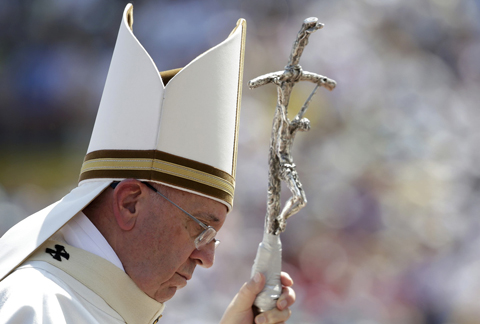June 12 | ![]() 0 COMMENTS
0 COMMENTS ![]() print
print

Message of peace as conflicts rage on
This week’s editorial leader
We have heard the current Holy Father, like his predecessors, promote the eternal message of peace throughout the years, probably to the point that even the Faithful become somewhat immune to the words on occasion in spite of our best efforts.
Wartime Popes and peacetime Popes alike responded to news of conflict throughout the world by praying for peace. It could be reasonably argued, however, that Pope Francis has taken things a little further.
In recent months the Vatican has called for reasonable western intervention against ISIS and Pope Francis himself last year called the conflicts in the world today a ‘Third World War’ being fought ‘piecemeal, with crimes, massacres, destruction.’
Last weekend during his trip to Bosnia, Pope Francis said the world today was haunted by atmosphere of war. He made the comments while in Sarajevo, adding: “Some wish to incite and foment this atmosphere deliberately. But war means children, women and the elderly in refugee camps, it means forced displacement, destroyed houses, streets and factories: above all countless shattered lives.
“You know this well having experienced it here.”
There are internal as well as external conflicts brewing for the Vatican. On the return fight from his trip to Sarajevo, Pope Francis spoke of an imminent announcement on Medjugorje, a Marian shrine that can divide opinion in the Church. The reports of apparitions there have been a source of both controversy and conversion. Ahead of a Vatican ruling, last October the Congregation for the Doctrine of the Faith directed that clerics and the Faithful ‘are not permitted to participate in meetings, conferences or public celebrations during which the credibility of such “apparitions” would be taken for granted.’
The differing opinions on the way forward regarding Holy Communion for those in irregular partnerships is another issuing brewing for the Church, this time ahead of this year’s synod on the family.
Such contentious issues having the potential to cause schism in our Church is a worse case scenario. One avenue that always remains open to us for comfort and guidance, however, is prayer. That and a desire to look more for what unites us than what divides us must ultimately be the way forward.
We cannot in good conscience ask those who took part in Orangefest in Glasgow, for example, to let go of past prejudice for the greater good if, within our own Church, we allow perceived clashes between our tradition and our future to divide us.











